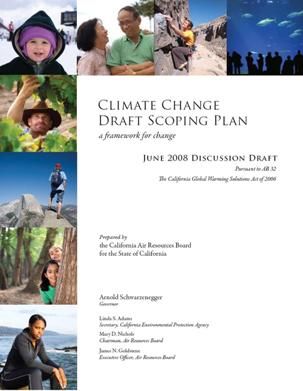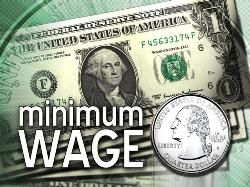Only in CA: Costly edicts depicted as jobs programs
by Chris Reed | June 17, 2014 8:15 am
When Gov. Arnold Schwarzenegger signed AB 32 into law in 2006, he did so after first demanding that the measure include a provision that would allow a governor to suspend it if there was evidence the law was hurting the economy. This was in recognition of the fact that forcing the state to have more costly energy than its economic rivals in other states and nations was fundamentally risky.
 But two years later, however, Schwarzenegger — in full legacy-hunt mode — didn’t say squat when the California Air Resources Board released a “scoping” plan of the economic impact of AB 32 that was full of happy talk that depicted the law as akin to a job-creation program[1].
But two years later, however, Schwarzenegger — in full legacy-hunt mode — didn’t say squat when the California Air Resources Board released a “scoping” plan of the economic impact of AB 32 that was full of happy talk that depicted the law as akin to a job-creation program[1].
Professional economists pushed back. The “peer review” of the findings was harsh. The panel included Harvard’s Robert Stavins[2] — perhaps the world’s leading environmental economist. Stavins backed AB 32 but considered its happy talk ridiculous. “I have come to the inescapable conclusion that the economic analysis is terribly deficient in critical ways and should not be used by the state government or the public for the purpose of assessing the likely costs of CARB’s plan,” he wrote.
Stavins later told The Wall Street Journal that if shifting to cleaner-but-costlier energy were good for businesses, they would have already done it.
That’s such a crisp, simple Occam’s Razor way to frame this issue.
Unfortunately, in the California of 2014, when it comes to economics, we’re in a post-common sense era.
‘Skimp’ on wages? You’ll make less money!
This is playing out in San Diego, where the City Council’s liberal supermajority wants to make a big splash before November elections in which they are likely to lose their power to impose legislation over a veto by Republican Mayor Kevin Faulconer.
The main way they want to make this splash is by sharply increasing[3] the minimum wage in the city. The initial proposal was to make it $13.09 cents an hour by July 2017. That would be nearly one-third higher than the $10 that will be the minimum state rate effective 2016.
 Business interests point out that this will hurt San Diego on competitiveness grounds. Advocates initially responded by saying job losses from a minimum wage hike would be minimal. But somewhere along the way, the spirit of the loony air board infected their thinking, and now San Diegans are being told that a minimum-wage hike is, yes, a rising tide that will lift all boats.
Business interests point out that this will hurt San Diego on competitiveness grounds. Advocates initially responded by saying job losses from a minimum wage hike would be minimal. But somewhere along the way, the spirit of the loony air board infected their thinking, and now San Diegans are being told that a minimum-wage hike is, yes, a rising tide that will lift all boats.
Consider this nugget from this op-ed[4] defending the City Council’s plan. The gist is that business operators who try to keep costs down are idiots who don’t know what they’re doing:
“Employers who skimp on wages and benefits don’t make more money, they make less. They have greater turnover, resulting in more training, and they engender less loyalty and more cheating.”
Oh, give me a break.
CA activists lecture business on how to make money
According to this one-size-fits-all theory, Wal-Mart and carwashes and taco stands and all the non-union companies in the world that try to keep wages down are simply buffoons who are lucky to still be in business.
The arrogance of this is stunning.
The truth, of course, is that — as the world’s leading environmental economist told The Wall Street Journal — businesses won’t reject strategies that make them money. They will embrace such strategies.
But as I said, we’re in a post-common sense era in which activists and liberal pundits who have never made a payroll or run a business look at successful businesses and say something akin to the following:
Hey, you idiots, you don’t know what you’re doing.
Surreal. And so California-ish.
- a job-creation program: http://spectator.org/articles/38810/californias-green-nightmare
- Robert Stavins: http://www.hks.harvard.edu/fs/rstavins/
- sharply increasing: http://www.utsandiego.com/news/2014/Apr/23/minimum-wage-hike-todd-gloria-poverty-san-diego/
- op-ed: http://www.utsandiego.com/news/2014/jun/12/raising-pay-will-help-all-businesses/
Source URL: https://calwatchdog.com/2014/06/17/only-in-ca-costly-edicts-depicted-as-jobs-programs/